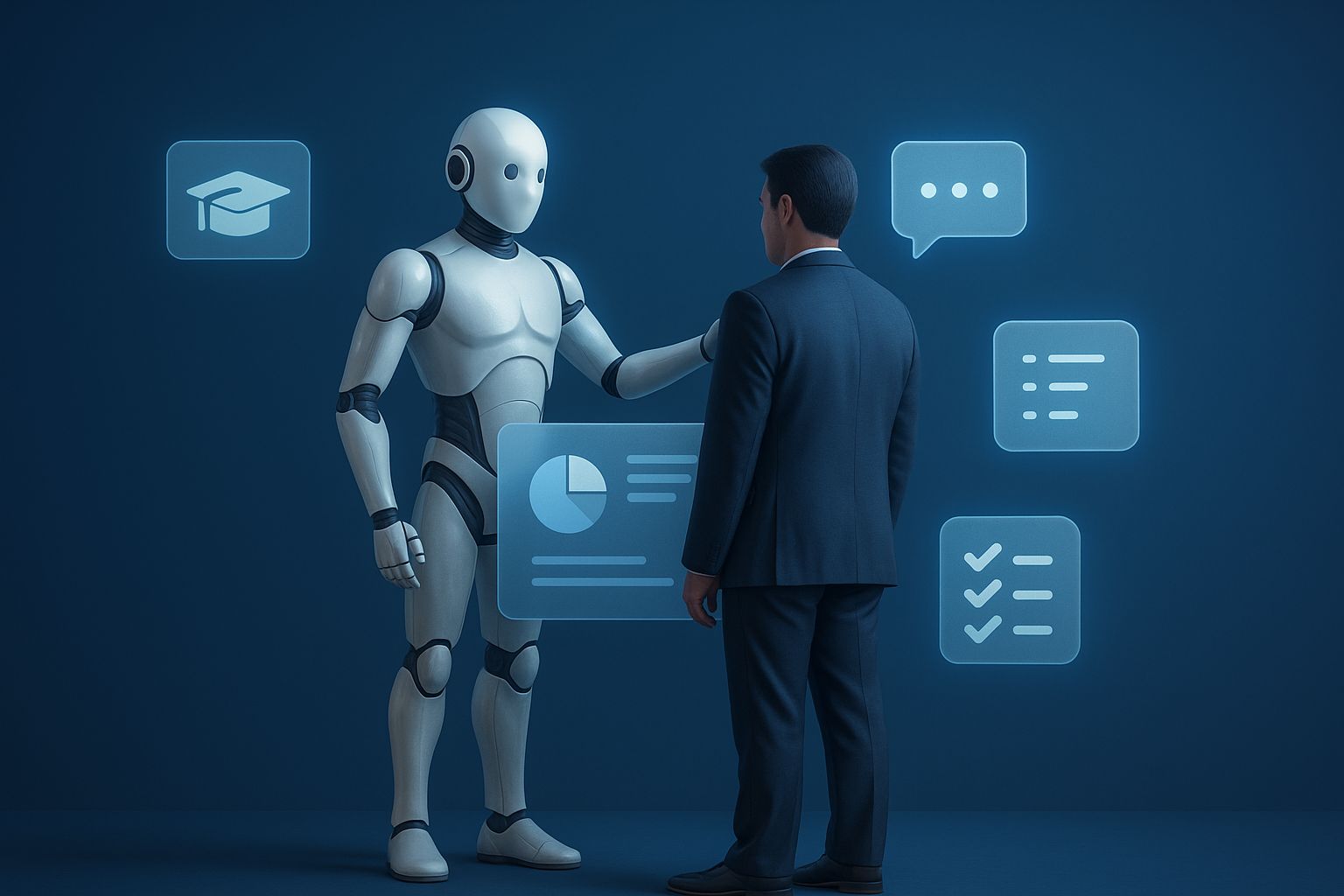- Product Upfront AI
- Posts
- 🤖 Why everyone's suddenly obsessed with AI agents
🤖 Why everyone's suddenly obsessed with AI agents
(I finally get it)

Here's a question that's been keeping me up at night...
What if I told you I have a team member who works 24/7, never complains about Monday mornings, doesn't need coffee breaks, and costs less than your Netflix subscription?
You'd think I was joking, right?
But I'm not.
I'm talking about AI agents. And no, they're not just fancy chatbots with a new name. (What I thought they were)
Let me explain...
A few weeks ago, I was drowning in emails at 11 PM (again).
My inbox had 87 unread messages. Most were routine stuff, customer questions, meeting requests, newsletter signups, asking "when's the next post?"
I thought: "There has to be a better way."
That's when I discovered AI agents.
And honestly? It felt like cheating.
The next morning, I woke up to ONE email. Not 87. One.
My AI agent had read all 87 emails, categorised them, drafted responses to 23 routine ones, flagged 8 urgent messages, and summarised everything in a tidy morning briefing.
The total time I saved was 2.5 hours.
And I hadn't lifted a finger.
That's when I realised: This isn't just another AI tool. This is a fundamental shift in how work gets done.
So What Exactly IS an AI Agent?
Here's the simplest way I can explain it:
Traditional AI (like ChatGPT) is like hiring a brilliant consultant who sits at your desk.
You ask: "Write me an email."
They write it.
Then they sit there. Waiting. Staring at you.
They won't do anything else until you tell them exactly what to do next.
AI agents are different.
They're like hiring an actual employee who understands the goal, figures out the steps, and executes everything, without you micromanaging every single move.
You say: "Handle my customer support emails."
The agent:
Reads incoming emails
Checks your knowledge base
Draft personalised responses
Sends replies
Updates your CRM
Flags anything unusual
All. By. Itself.
The magic word? Autonomy.
Chatbots wait for commands. AI agents pursue goals.
If you are still confused, watch this video
I was explaining this to my friend last week.
She runs a small bakery and was skeptical.
"So it's like a robot assistant?" she asked.
"Not quite," I said. "Let me show you the difference."
Scenario: A customer complains about a billing error.
Customer: "I was charged twice this month. Can you fix this?"
What a Regular Chatbot Does:
Sees the word "billing"
Spits out: "Here's a link to our FAQ! 😊"
Does absolutely nothing else
What an AI Assistant Does:
Understands there's a billing problem
Asks clarifying questions: "Which month? Do you have your transaction ID?"
Provides helpful information
Still waits for YOU to actually fix it
What an AI Agent Does:
Understands the billing issue instantly
Checks the customer's payment history (via your payment system API)
Confirms the duplicate charge
Initiates the refund automatically
Notifies the customer: "We found the duplicate charge and refunded $49.99. It'll appear in 3-5 business days."
Document everything in your records
All in under 60 seconds.
I know you might be thinking
"Wait. Can it do that?"
Yes. Yes, it can.
And that's why this is bigger than most people realise.
The Part Where I Geek Out (But Keep It Simple)
You know what's wild?
AI agents actually "think" like humans.
They follow something researchers call the Thought-Action-Observation cycle.
Sounds fancy, but it's basically how your brain works when you're solving a problem.
Let me show you with a real example from my life:
My instruction to the agent: "Research our top 3 competitors and summarise their pricing."
Here's what happened behind the scenes:
Thought (Agent's internal monologue): "Okay, I need competitor info. First, find their websites. Then extract pricing. Then compare."
Action:
Searches Google for competitors
Visits their pricing pages
Extracts data
Organises it into a table
Observation: "Hmm, I only found 2 competitors. I need to search for the third one."
Thought (refined): "Let me try a different search query."
Action:
New search
Finds the third competitor
Extracts pricing
Observation: "Perfect. Now I have all three. Time to create the summary."
Action:
Compiles everything
Creates a comparison table
Highlights key differences
Email me the final report
The result?
A task that would've taken me 2 hours was done in 8 minutes.
And the agent didn't complain once.
The Five Ingredients of Every AI Agent
Okay, here's where it gets slightly technical.
But stay with me, I promise this will make sense.

Every AI agent has five parts:
1. The Brain (The LLM)
This is the "thinking" part—powered by models like GPT-4 or Claude.
It's what understands your goal and plans how to achieve it.
Think of it as the agent's intelligence.
2. The Memory
Short-term memory: What happened in this conversation
Long-term memory: Everything it's learned about you, your preferences, past interactions
Without memory, your agent would be like that friend who asks the same questions every time you meet.
Annoying.
3. The Hands (Tools & APIs)
These let the agent actually DO things:
Send emails
Update your CRM
Search the web
Process payments
Schedule meetings
Without tools, the agent is just a very smart rock. It can think but can't act.
4. The Strategy (Planning Module)
This breaks big goals into smaller steps.
Like a project manager who figures out: "First we do this, then that, then check if it worked."
5. The Learning Loop
The agent learns from what works and what doesn't.
It gets better over time.
Kind of like you after your third cup of coffee
I know what you're thinking.
"This sounds great, but... is this going to replace my job?"
Let me be honest with you.
Yes, AI agents will change jobs.
But here's what the data actually shows:
The Fear:
Headlines scream: "300 million jobs at risk!"
People panic
LinkedIn fills with doomsday posts
The Reality:
Two-thirds of jobs will experience partial automation
Meaning: about 25% of your tasks get automated, not your entire job
The boring, repetitive stuff disappears
You get freed up for the interesting work
Real example: Klarna (a fintech company) cut 40% of staff with AI agents.
Then... they had to rehire people a few months later.
Why? Because automating entire jobs doesn't work. Automating specific tasks does.
The Opportunity:
Workers with AI skills now command a 56% wage premium.
That's up from 25% just last year.
Translation: If you understand AI agents, you're more valuable. Not less.
"But I'm Not a Coder... Can I Even Do This?"
This is the question I get most.
And the answer is: You absolutely can.
Here's the beautiful part about 2025:
You don't need to code anymore.
There are platforms where you literally drag boxes around on a screen, connect them, and boom, you've built an AI agent.
Tools you can use right now:
n8n – Drag-and-drop workflows (14-day free trial, no credit card)
Make.com – Visual automation builder
Zapier – Connect apps with AI
Botpress – Open-source, visual builder
Real story: A Microsoft Copilot Studio user (non-technical) saved their company $500,000 by building AI agents.
Zero lines of code written.
If they can do it, so can you.
Why Is Everyone Talking About This NOW?
You've probably noticed AI agents are EVERYWHERE suddenly.
That's not random. Three big things happened in 2025:
1. The Market Exploded
AI agents market: $5.43 billion in 2024 → $7.92 billion in 2025
That's 45% growth in one year.
For reference, that's faster than smartphones grew in 2008.

2. Major Companies Went All In
OpenAI launched "Operator" (consumer AI agent)
Google released Gemini with agent capabilities
Microsoft deployed Copilot Vision
Salesforce launched Agentforce
When Apple, Google, AND Microsoft all launch agent products in the same year?
That's not a trend. That's a transformation.
3. Search Interest Hit Peak
Google searches for "AI agents" hit 100% interest in June 2025.
For comparison, that's the same search volume as "iPhone" in 2007.
We're at an inflexion point.
What You Can Actually Do This Week
Okay, enough theory.
Now it’s time to show you something
Here's your action plan:
Step 1: Try Building One (30 Minutes)
Sign up for n8n (free trial, no credit card required)
Follow their "5-minute AI agent" tutorial
Build something ridiculously simple—like an email summarizer
Watch it work
Feel like a wizard
Step 2: Find One Agent You Could Use TODAY
Think about the most boring, repetitive thing you do every day.
Then search YouTube: "AI agent for [your boring task]"
Watch someone else do it.
Ask yourself: "Could this save me time?"
If yes, try building it this week.
Step 3: Learn the Language
Bookmark these terms:
LLM (Large Language Model)
Prompt
ReAct (Reasoning + Acting)
Orchestration
Multi-agent systems
Within a month, you'll sound like you've been doing this for years.
If you're reading this in November 2025, you're ahead of the curve.
By 2026, understanding AI agents will be expected, not premium.
The window to gain an advantage is open right now
Before You Go
So here's my question for you:
What's the one task you'd love to never do again?
The thing that makes you groan every time it pops up?
Reply and tell me. I'm genuinely curious.
Happy automating!
P.S. — If you build your first AI agent this week, reply and tell me what you made. I want to hear about it. Seriously.

Reply